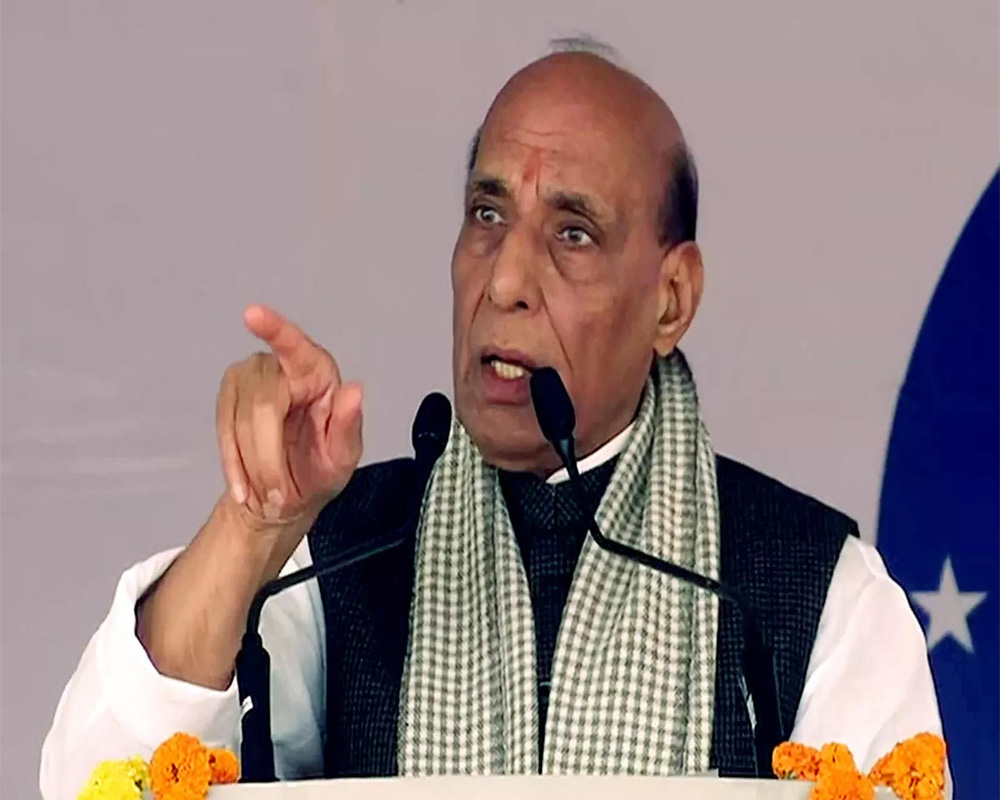Defence Minister Rajnath Singh on Saturday said India has never attacked any country out of hatred or contempt but if its interests are threatened, "we will not hesitate to take a big step".
On the occasion of Vijayadashami, Singh performed "Shastra Puja" (worship of weapons) at the Sukna military station in West Bengal, and said that the ritual is a "clear indication that if need be, weapons and equipment will be used with full force".
The Sukna-based 33 Corps, popularly known as the 'Trishakti' Corps, is responsible for guarding the Line of Actual Control (LAC) with China in the Sikkim sector.
"India has never attacked any country out of hatred or contempt. We fight only when someone insults or tries to harm our integrity and sovereignty; when war is waged against religion, truth and human values. This is what we have inherited. We will continue to preserve this heritage," Singh said in a statement issued by the defence ministry.
"However, if our interests are threatened, we will not hesitate to take a big step. 'Shastra Puja' is a clear indication that if need be, the weapons, equipment will be used with full force," he said.
Earlier in the day, the defence minister shared photographs of the ritual on X.
"On the occasion of Vijayadashami in India, there has been a long-standing tradition of weapon worship. Today, I performed 'Shastra Puja' at the 33 Corps headquarters in Sukna, Darjeeling," he posted in Hindi.
Vijayadashami marks the end of Navratra and is celebrated as the festival of Dussehra.
This significant ceremony -- 'Shastra Puja' -- in the Indian Army symbolises the respect for weapons as the protectors of the nation's sovereignty, the ministry said.
The event was attended by Army Chief Gen Upendra Dwivedi, Defence Secretary-designate R K Singh, General Officer Commanding-in-Chief of Eastern Command Lt Gen Ram Chander Tiwari, DG, Border Roads, Lt Gen Raghu Srinivasan, General Officer Commanding of Trishakti Corps Lt Gen Zubin A Minwalla and other senior officers.
The defence minister initiated the rituals with 'Kalash Puja', followed by the 'Shastra Puja' and 'Vahan Puja'.
Singh also interacted with the troops at the Sukna military station.
"The rituals, performed to seek blessings for strength, success and safety, reaffirm the cultural and spiritual depth of Dussehra, underscoring the pivotal role of weapon systems in safeguarding the country," the statement said.
They symbolise the preparedness, resolve and unwavering dedication of the armed forces to protect the nation, it added.
"The ceremony highlighted the Indian Army's blend of tradition and modernisation, with a focus on preserving India's sovereignty and promoting indigenous defence systems and platforms," the statement said.
Singh commended the vigilance and critical role of the armed forces in maintaining peace and stability along the borders.
He said Dussehra symbolises the victory of good over evil.
Singh was scheduled to address the Army Commanders Conference in Gangtok on Friday in person.
But due to bad weather in the Sikkim capital, he addressed them through video conference from the Army location in Sukna.
The conference came amid a lingering border row in eastern Ladakh. Its first phase was hosted in a forward area in Sikkim's Gangtok, a location that holds significance for the Indian Army, given its proximity to the Line of Actual Control (LAC).
Singh in his address to the top commanders of the Army expressed confidence in the force in dealing with "any contingency", even as he said the ongoing talks with China for a peaceful resolution of the row "will continue at all levels".
























